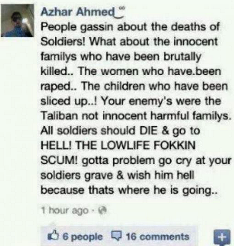26 Mar 2012 | Asia and Pacific, Index Index, minipost
A Bangladesh court last week ordered government authorities to shut down five Facebook pages and a website for blasphemous content. Judges at the high court in Dhaka ordered the telecommunications regulator, home ministry officials and police to block the offending content after two university lecturers filed a lawsuit complaining that the pages and the site were hurting people’s religious sentiments. The pages were deemed to contain “disparaging remarks and cartoons” about the Prophet Mohammed, Jesus, the Koran, Lord Buddha and Hindu gods. In 2010, Facebook was temporarily blocked on charges of malicious propaganda against the Prime Minister and hurting religious feelings.
20 Mar 2012 | Index Index, minipost, United Kingdom
The teenager accused of making “grossly offensive” comments about the deaths of six British soldiers in Afghanistan has denied charges against him. Azhar Ahmed, of West Yorkshire, appeared before Dewsbury Magistrates’ Court today. Ahmed is charged under the Communications Act 2003 after allegedly posting a message on Facebook earlier this month commenting on the relative coverage of British soldiers killed in a bomb blast in Afghanistan and the deaths of Afghan civilians. The teen also faced a racially-aggravated public order charge, but this was withdrawn before the court today. Ahmed will will stand trial at Huddersfield Magistrates’ Court on 3 July.
20 Mar 2012 | Uncategorized
Another week and another case of a young man getting into trouble over social media postings.
Last week, it was Azhar Ahmed, who angrily ranted about soldiers on his Facebook page, and now faces trial under the Communications Act 2003 (though the initial charge that his posting had been “racially aggravated” has been dropped).
This week, it is Swansea student Liam Stacey. Twenty-one-year-old Stacey today pleaded guilty of a “racially aggravated public order offence” after he tweeted racist remarks about Bolton Wanderers footballer Fabrice Muamba, and then addressed further racist remarks at tweeters who challenged him. (you can view Stacey’s now-deleted timeline here. Very strong language http://www.youtube.com/watch?v=nA5v2eZ5ZZE).
The two cases have several common elements. Both involve social networking sites. Both involve young men. Both outbursts were reactions to widespread, communal grief.
And both raise the question: is the law as it stands fit for purpose? The pace at which social media changes the way we communicate is startling, even though the intuitive nature of much of the technology we use makes it seem normal. It is difficult now for many to remember life before Twitter, and almost impossible to think of life before YouTube, just seven years ago. We do not really think of posting a tweet or a Facebook status update as “publishing” or “sending a message” in the same way as printing a leaflet or even sending a text message.
The Twitter Joke Trial rightly upset many people, who saw in the prosecution of Paul Chambers a misunderstanding of both the message and the medium. But the question is, can a law be formulated that will accommodate free expression online? Or, given the changing nature of electronic communication, is any law doomed to obsolescence?
Padreig Reidy is Index on Censorship’s news editor
13 Mar 2012 | Uncategorized
Yorkshire 19-year-old Azhar Ahmed is facing charges of “racially aggravated public order offences” after he posted an angry Facebook status update about the reporting of the latest British Army fatalities in Afghanistan.
Ahmed’s sentiment (see pic) was not unsual. He starts off with the widely repeated complaint that deaths of British soldiers are given blanket coverage, while deaths of Afghans barely merit a mention. This is true, and hardly controversial.

Ahmed’s mistake, apparently, is to continue to vent his anger, and suggests that British soldiers should all die and go to hell. Strong language, but does it tip into incitement to violence? I think not. Nor, for that matter, do West Yorkshire police, who have not pursued Ahmed on this charge. Rather, they have sinisterly construed Ahmed’s comment as “racially aggravated”.
Serving British army soldiers do not count as an ethnicity. So why angry words about them could be seen as racially aggravated is a mystery. But perhaps unwittingly, those responsible for this charge have revealed something dark about the way the war in Afghanistan is now viewed.
Unconditional support for soldiers is now expected, even as we become increasingly unsure of what they’re doing out there. From the most ardent supporter of the war to the most strident critic, everyone claims to be acting in the interest of Our Brave Boys. This is now not a matter of politics, but loyalty. This question is compounded in Ahmed’s case, as the six soldiers killed were all from the local Yorkshire Regiment. Ahmed’s home town Dewsbury was also home of Britain’s best-known suicide bomber, Mohammad Sidique Khan, in the months before his attack on London. Suspicion of young Muslims voicing anti-troops opinions in the area is predictable.
But still the “racially aggravated” charge doesn’t stick, unless one is willing to buy into the notion that Afghanistan is part of an ethno-religious war between “Islam” and “the West”. This is the line that the likes of Anjem Choudary have been pushing for years. And now it seems West Yorkshire police agree.

